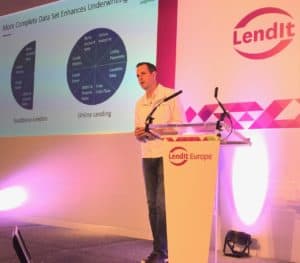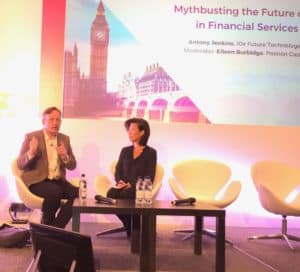
LendIt Europe took place in London earlier this week with around 1000+ attendees participating including a good showing of regular suspects and an emerging group of early stage, aspiring Fintech firms. For both presenters and attendees the backdrop of the Brexit decision and the uncertainties of Europe colored most of the proceedings. While London remains the leading Fintech Hub in the world, Brexit has called this prominence into question. Can London continue to lead the world in financial innovation? As some banks move employees to cities like Frankfurt or Paris, will Fintechs follow?
 Keynote speakers included a fascinating presentation on Open Banking from Imran Gulamhuseinwala OBE, Global Head of Fintech at consultancy firm EY.Gulamhuseinwala is leading the Open Banking charge within the UK. The project appears to be moving quite rapidly with the technical API standards expected to be ready for UK banks and Fintechs as soon as PSD2 kicks off in January 2018. The EU, by comparison, will linger behind with technical standards only by mid-2019. The net beneficiary of Open Banking will be consumers who will control their data – as they should – and the ensuing competition engendered as services are compelled to do more for less.
Keynote speakers included a fascinating presentation on Open Banking from Imran Gulamhuseinwala OBE, Global Head of Fintech at consultancy firm EY.Gulamhuseinwala is leading the Open Banking charge within the UK. The project appears to be moving quite rapidly with the technical API standards expected to be ready for UK banks and Fintechs as soon as PSD2 kicks off in January 2018. The EU, by comparison, will linger behind with technical standards only by mid-2019. The net beneficiary of Open Banking will be consumers who will control their data – as they should – and the ensuing competition engendered as services are compelled to do more for less.
Renaud Laplanche, founder and CEO of Upgrade and co-founder of LendingClub, shared his vision of the online lending world. His optimistic spin argued that online lenders will be able to easily compete with traditional finance – especially newer firms (like Upgrade) that possess better tech and access to cheap forms of capital, comparable to traditional banks.
Jaidev Janardan, CEO of Zopa, was on hand to share his vision of the future of banking. Zopa has filed for a banking license and is thus poised to become an digital challenger bank leveraging better technology minus the cost of bricks and mortar locations.
Below is a sampling of statements heard at LendIt Europe 2017. It will be interesting to see if the annual conference will be held in Berlin, or perhaps Paris, next year.
“Data that the bank holds on the consumer belongs to the consumer and not the bank.”
“Standardized Open Banking in the UK will give real control to people over their finances … 6 to 10 million people [in the UK] are in the wrong financial product. Costs too much, does not work for them.”
Imran Gulamhuseinwala OBE, Global Head of Fintech at EY
 “Banks have outdated technology. To change that takes a lot of effort. From where they are starting, it is not easy.”
“Banks have outdated technology. To change that takes a lot of effort. From where they are starting, it is not easy.”
“Your business model has to be one where you win, when the customer wins.”
“Finance is intensely personal … with the bank, we get very depersonalized services.”
Jaidev Janardana, CEO of Zopa
“They [customers] want to be part of the story of building something. We have a very active community debating what the product is going to look like. Customers expect to be part of the creation of the product. They also want to be heard.”
“We hope to be at about 100,000 [customers] at that end of the year.”
Anne Boden, CEO and founder of Starling Bank
 “Users do not really care about the tech. They just know it works.”
“Users do not really care about the tech. They just know it works.”
“It took us 2 years to get an opinion from BaFin, and another year to be regulated, so three years overall.”
Radoslav Albrecht, CEO and founder of BitBond
“Why does the entire model make sense? It is a cost reduction. Lower cost. Better experience. 400 to 600 basis points of savings.”
“An organized secondary market for online loans will emerge in the next 15 months.”
“As for Cost of Capital. Marketplace lending has access to a very wide range of cost of capital. A lot of platforms sell loans to banks. You have Credit Unions buying loans. Credit Unions have a return target of 2 to 3%. Lower than Goldman Sachs. Marketplace Lenders have access to similar cost of capital.”
Renaud Laplanche, CEO and founder of Upgrade
 “The biggest myth of all is that Banks and other financial services are advantaged at this. They have all the data. The truth is the data is fragmented across all different tech stacks and it is difficult to utilize. Very expensive and slow. The data is in the wrong place.”
“The biggest myth of all is that Banks and other financial services are advantaged at this. They have all the data. The truth is the data is fragmented across all different tech stacks and it is difficult to utilize. Very expensive and slow. The data is in the wrong place.”
“In innovation you have to move fast and fail fast. I think it is possible we will see collaboration but it will be awkward. Will see CEOs ring fence it and protect it because the mothership is programmed to kill it.”
“We have seen the heyday of banking profitability and that will never return.”
Antony Jenkins, CEO and founder of 10X Future Technologies
 “Yes, I think they [Apple, Google, Amazon etc.] will dominate the market. Question is on what regulatory authority … If you talk to folks here, you ask them who they are worried about. These are the companies they are worried about.”
“Yes, I think they [Apple, Google, Amazon etc.] will dominate the market. Question is on what regulatory authority … If you talk to folks here, you ask them who they are worried about. These are the companies they are worried about.”
“IF we believe that SMEs are important to the economy, we want to be certain we have many options to provide credit. The Fintechs woke up the banks. That was good for competition. and good for the small business customer.”
Karen Mills, former Head of the SBA, Senior Fellow at Harvard Business School

